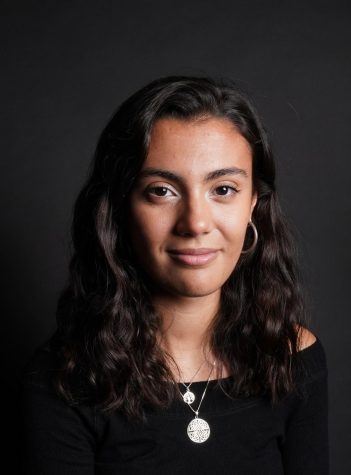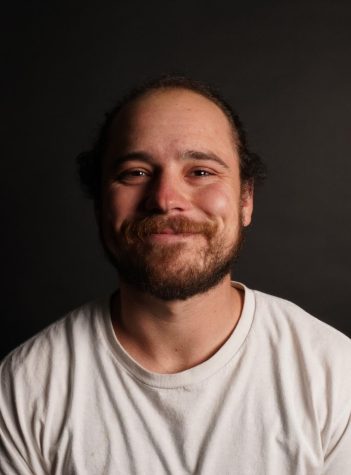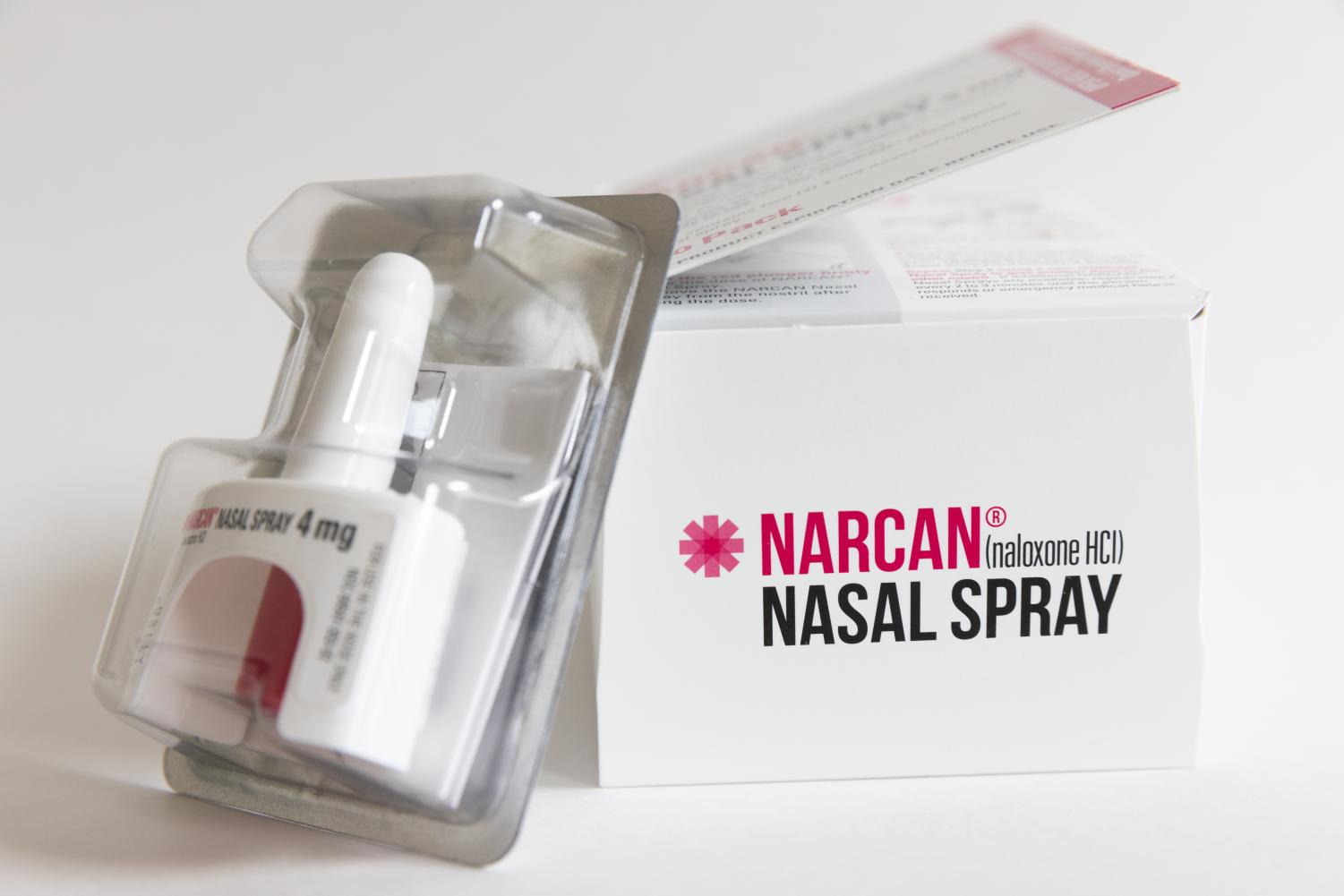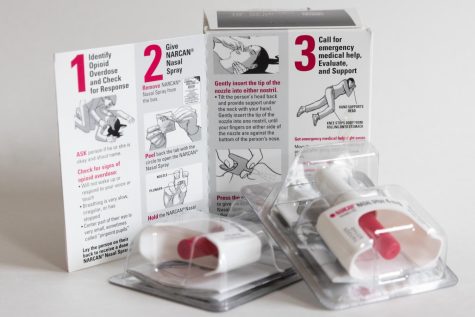



Any student, faculty or staff member can grab the nasal spray that prevents opioid overdose no questions asked.
Apr 25, 2023
Lifesaving is a term often used to describe the effects of Narcan. Naloxone hydrochloride, a narcotic commonly known by the brand name Narcan, saves lives by reversing an opioid overdose.
The opioid crisis is a growing worldwide epidemic and in San Francisco in particular. According to San Francisco’s Office of the Chief Medical Examiner, the crisis contributed to 620 accidental overdose deaths in 2022.
The Tenderloin is the city’s focal point of the epidemic. People from ages 35 to 64 are most commonly affected, but last March people aged 25 to 34 made up 14% of accidental overdoses.
Narcan is a nasal spray used to counteract overdose by opioids. The main ingredient is naloxone, an antagonist opioid capable of completely reversing the effects of overdose within minutes. It can save lives if administered in time.
Last month, the U.S. Food and Drug Administration approved the distribution of the treatment without a medical prescription. The strategy focuses on liberating its use, making it more accessible but also getting rid of stigmas that may be attached to it.
Health Promotion & Wellness Center at SF State first provided Narcan in February 2023. They received 360 packages through the California Department of Public Health’s state naloxone distribution order.
Narcan’s use is very simple. The instructions are in the package, but the center encourages users to watch an explanatory video and also understand the signs of an opioid overdose. All this information is provided on HPWC’s website.
HPWC Substance Use Education Coordinator Elizabeth Gandara, emphasizes that once Narcan is administered, it is important to call 911.
So far, around 50 people have requested Narcan at SF State’s HPWC.
Gandara notes opioids are not a great part of SF State students’ consumption but that some students have requested the medication before attending music festivals like Coachella or Beyond Wonderland.
“There is not enough information in our NCHA [report] to actually indicate that opioids or illicit opioids [that] are not prescribed from a doctor, or if fentanyl is actually a commonly used drug amongst college students,” Gandara said.
According to SF State’s American College Health Association-National College Health Assessment, cannabis, tobacco and alcohol were the most common substances consumed by students in Spring 2021. Prescription opioids with non-medical use, heroin or methamphetamine, for example, ranked second place.
In an effort to prevent overdose, the HPWC has implemented an Opioid Overdose Prevention Plan. As part of prevention, the center offers Narcan and fentanyl test strips.
HPWC Director Karen Boyce explains the decision behind the plan and its implementation at SF State.
“Although our data kept telling us that the number of students here at SF State was pretty small that uses opioids, there’s still a number, so we still want it,” Boyce said. “There are some students still using it and it is really dangerous as far as its risk for overdose and so we wanted to be able to provide some resources for them.”
There are currently two places where any student can get Narcan: the HPWC and Student Health Services. However, they plan on expanding into areas with more student traffic, such as the Cesar Chavez Student Center or the library. The objective is also to partner with other organizations on campus, such as Residential Life.
HPWC also provides workshops on how to prevent different types of overdoses.
“Students who maybe are feeling skittish or uncomfortable going in person, or asking these questions in a workshop or things like that – which makes sense, there’s so much stigma around drug use, especially opioid use – might not feel comfortable going into those spaces,” Boyce said.
Narcan can be acquired through the website or in person. Filling out the form is optionable.

Police officers on campus have been trained in the use of Narcan and carry some supplies with them. They are often the first responders in these types of situations.
“If they came to a situation where they were called, and so that they would have it right then and there and would not have to wait for an ambulance to come,” Boyce said.
Fentanyl, as well as other opioids, can be used for licit or illicit purposes. However, illicit fentanyl is distributed on the streets due to its similar effect to heroin at a lower price.
This substance is also sometimes added to other drugs, contaminating them and increasing its potency. Therefore, people consuming other drugs like cocaine, heroin and methamphetamine can be exposed to it unintentionally.
According to the Centers for Disease Control and Prevention, fentanyl “is up to 50 times stronger than heroin and 100 times stronger than morphine.”
It has become the main reason for accidental overdoses in San Francisco. Fentanyl was the cause of 52 out of the 66 overdose related deaths that occurred in March 2023.
HPWC already collaborates with different organizations like the National Harm Reduction Coalition. NHRC offers different services at a national level, such as naloxone distribution and overdose prevention education through the DOPE Project.
Andrea Figueroa, DOPE project manager, highlights the importance of places like universities to generate open conversations about substance consumption.
“These new things are happening [at] universities, and there’s a crucial space for us to learn, especially rather than giving them [the] “don’t do drugs” kind of model,” Figueroa said. “Let’s look at a model that’s more nuanced and talks about the complexities and actually reduces the risk.”
It is important to know that Narcan cannot reverse other types of overdoses, only ones caused by opioids.
Gandara speaks about why students may want to carry Narcan with them.
“If they have a friend or a loved one, if they are out in the city, and they see something out there, they want to be prepared,” Gandara said. “A lot of our work is definitely getting Narcan into the hands of people despite whether they use or not.”
For Figueroa, the sense of community is also the key to saving lives.
“The fact that most overdoses get reversed by other people who use drugs because they’re there, like people support each other,” Figueroa said. “Maybe you might not be the one using drugs, but maybe your friends are, and if you’re able to create an open space without stigma, you can make it easier for them to reach out to you.”

